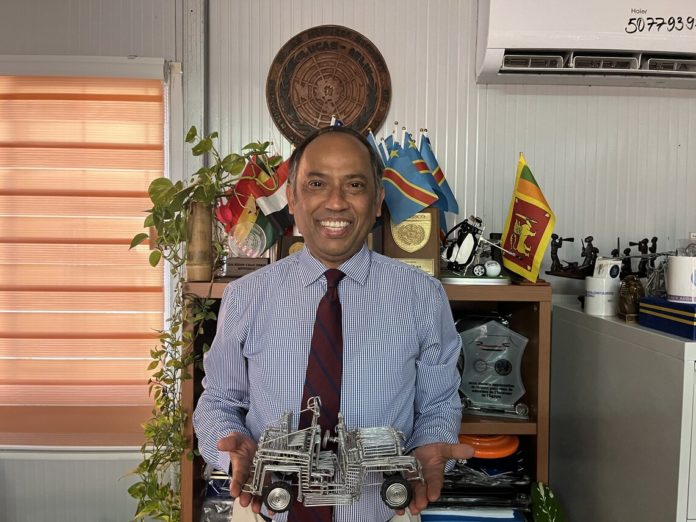Dr. Khan is not the only staff member who wants to do more. MONUSCO operates in the Democratic Republic of the Congo, one of the 5 poorest nations in the world according to the World Bank. The UN agency for Migration (IOM) recently announced that a staggering 7 million Congolese people have been pushed out of their homes by endemic conflicts in the mineral rich country, the highest number recorded to date.
Witnessing the daily pain of the Congolese people they serve can be difficult for many a peacekeeper, a difficulty compounded by the feelings of longing that come with serving far from home. While deployed, peacekeepers are often confronted with traumatic events that are typical of war zones. For example, they may witness death, be charged with recovering civilian corpses, or be involved in serious accidents. Peacekeepers are sometimes confronted with unexploded land mines or fired upon. They may find themselves accidentally in the crossfire of two armed feuding parties. Staff counselors like Dr. Khan lend peacekeepers a well-needed ear to help share the burden.
A recent study by the Division of Healthcare Management, Occupational Safety and Health (DHMOSH) found that almost a third of peacekeepers reported disturbed sleep and/or eating patterns while serving. For others, symptoms can appear later, sometimes long after they have served. Post-traumatic stress disorder, more commonly known under its acronym PTSD, is a mental health condition that can develop in people who have experienced or witnessed traumatic events and can also affect peacekeepers. While symptoms can look different for everyone, common manifestations include flashbacks, hypervigilance, disruptions of sleep and eating patterns and irritability and anger management issues.
A literature review performed by DHMOSH found that PTSD prevalence rates in 20 studies varied from 0.5 to 25.8 %, with a pooled post-deployment prevalence rate of 5.3 %. While studies predominantly analyze Western peacekeepers between 1997 and 2008, Dr. Adarsh Tiwathia, Deputy Director of DHMOSH says these feelings are universal but fewer cases are being reported from other countries for a plethora of reasons:
“When we speak of military personnel in particular, the ones who are probably most exposed to violent acts, the military culture comes with a strong masculinity that sometimes leads staff to be afraid of reporting symptoms. Besides, many countries lack the mechanisms needed to identify mental health issues and for them to get the support required.”

Here in Kinshasa, people flow in and out of Dr Khan’s office as if to recharge on positivity but he has had to deal with severe cases as well and he tells us that the feeling of giving to, and helping others is what helps him push through difficult times.
“It isn’t easy and if you don’t take a minute to stop and think about how you feel and acknowledge these feelings, it might be too late before they overwhelm you and evolve into something deeper that might seriously impact your mental health and your life,”said the doctor who started serving for the United Nations 25 years ago in Bosnia, working on human rights in human trafficking among other issues.
He has experienced PTSD first hand and is grateful that he was able to tap into existing support to help him overcome his experiences in Bosnia but also Liberia, Lebanon, where he served in the aftermath of the 2006 Lebanon War or Darfur, where he was assesting investigations on armed attacks and rapes of UN Peacekeepers.
“My family is the key to my mental health. I am lucky to have a wonderful wife and lovely children – although very grown up ones -,” he jokes. “They support me and it is essential for me to have them to rely on and to push through for.”

In December 2022, the Security Council adopted resolution 2668 that recognized “the need to raise awareness of the importance of mental health and psychosocial support to United Nations peace operations personnel”. A mental health strategy for uniformed peacekeepers is being developed to raise awareness, train, and educate personnel, foster a culture of wellbeing and care, and provide psychosocial services when they return home.
This initiative needs support from Member States, including developing a mental health app providing information and resources for peacekeepers, screening and preparing personnel for complex and hazardous operating environments, and training to increase awareness, improve coping strategies, and reduce stigma.

“The more I bring people together the more successful we are. Awareness helps people understand the causes, their rights, how to prevent, how to report their issues, the duty of care and your own responsibility to improve and care for your wellbeing. I have now expanded these awareness sessions across the areas of operation of MONUSCO,” he added.
The December UN Peacekeeping Ministerial in Ghana will be an occasion to strengthen cooperation and develop partnerships between troop and police contributing countries to share their expertise, including through training and capacity-building in this area.
“When one peacekeeper suffers in a mission, it’s not just the individual who suffers, it’s his family, his extended family, his colleagues and his nation who suffer,” Dr Khan concluded.



